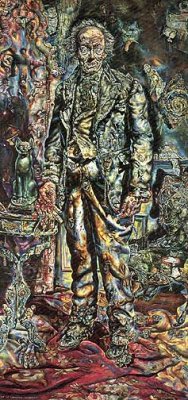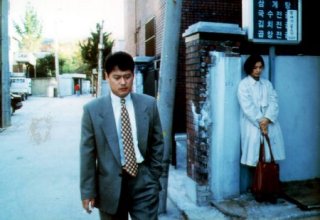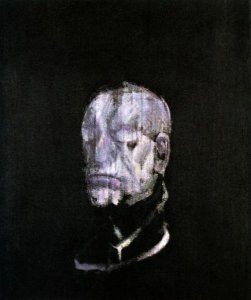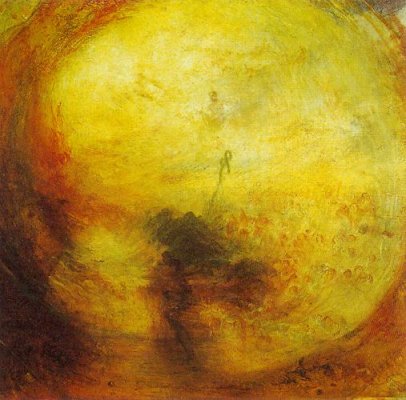Scene 2- in the restaurant
Him: What are you looking at ?
 Her: This salad, I can't help thinking about Arcimboldo. It's like Rodolphe II met Mike Tyson. His face is all broken! Even if I get your point, about the details in Hong Sang-soo's movies. I don't think this comparison makes sense. The two artistes are not trying to say the same thing. To me Arcimboldo was a political artist, what he was saying was that the princes and powerful people he was representing are made out of the same flesh as you and I. That's why his paintings are so disgusting...
Her: This salad, I can't help thinking about Arcimboldo. It's like Rodolphe II met Mike Tyson. His face is all broken! Even if I get your point, about the details in Hong Sang-soo's movies. I don't think this comparison makes sense. The two artistes are not trying to say the same thing. To me Arcimboldo was a political artist, what he was saying was that the princes and powerful people he was representing are made out of the same flesh as you and I. That's why his paintings are so disgusting...
Him: I don't understand...
Her: Because even if the pear-nose of Rodolphe is all fresh, shiny and juicy, you can't help thinking that it will soon become floppy, shabby and shrunken. What will Rodolphe look like when the worms will start digging holes in this vegetable face? Will he still be the proud and powerful Rodolphe on the painting ? They are Dorian Gray really.
Him: That's right, there is a political use of details in Arcimboldo's painting that you certainly can't find in Hong Sang-soo's films. But you do have this idea that the world is based on a very fragile structure. The Day a Pig Fell Into the Well is really a film about the world falling apart. Your description of Rodolphe II could match the writer or the salesman's destiny. The guy looks all clean and fresh like the pear-nose you described. He even works for a mineral water company. You can't find a purer activity than that!
Her: It's a wonderful casting, the actor really has quite a baby face!
Him: But on the bus, on his way to a professional meeting, someone vomits on his clean socks. As he cleans up his socks in the bathroom, he misses the bus and arrives late. No one would see him. So he calls a friend he has in town. The guy picks him up but won't drive him back. He has to walk under the sun for an hour. So he starts to sweat, his nice shirt is stained, his baby face is soaked. After that he has to spend the night in a yogwan. Under the blanket, the last customer has left a slimy spot...
Her: This vision terrifies him. Possibly because it reminds him of his own personal decrepitude: his relationship is falling apart at the same time.
Him: Absolutely. Finally he calls a prostitute. At the beginning he won't touch her, like he is aware of what's going to happen. Finally they are having sex... and the condom breaks, he runs to the bathroom to wash his penis as the prostitute laughs at him.
 Her: I love that scene. He is not so much afraid of catching AIDS or something, but disgusted by the contact of the flesh. The teacher in Kangwon Province also ends up lonely in a devastated office, staring at a single fish in a plastic bucket. It's as if he was looking at himself, thinking "Is that what my life is about?" There is also this image of turtles swimming followed by a shot of girls playing in the rivers of Sorak-san... and the shot of the writer playing with an insect in the beginning of The Day a Pig Fell Into the Well. I understand now, you like Hong Sang-soo just like you like Abel Ferrara's films, Bacon's or Arcimboldo's paintings and Radiohead's records, because they are all about the world falling apart!
Her: I love that scene. He is not so much afraid of catching AIDS or something, but disgusted by the contact of the flesh. The teacher in Kangwon Province also ends up lonely in a devastated office, staring at a single fish in a plastic bucket. It's as if he was looking at himself, thinking "Is that what my life is about?" There is also this image of turtles swimming followed by a shot of girls playing in the rivers of Sorak-san... and the shot of the writer playing with an insect in the beginning of The Day a Pig Fell Into the Well. I understand now, you like Hong Sang-soo just like you like Abel Ferrara's films, Bacon's or Arcimboldo's paintings and Radiohead's records, because they are all about the world falling apart!
Him: In his private life, Hong Sang-soo has had his share of self destruction, just like Abel Ferrara. He has said in several interviews that after graduating from high school he did not go to the university but spent a long time, over a year doing nothing, just sitting in his room smoking and then going out at night to drink. I remember him saying that he was destroying himself every day. So I guess he felt that edge, just like lots of artists did. He just expressed it differently.
Her: You mean that good art is about being pessimistic about life ?
Him: I don't think anyone can give a definition like that. In the case of Hong Sang-soo I don't think he is pessimistic, after all he is still alive! The world is falling down, but at the same time it is also building itself. Confronted by his own destruction, the salesman has to face his humanity. In The Power of Kangwon Province there is this beautiful scene, where the cop wants to commit suicide and tries to throw himself out of the window. As he is hanging in the emptiness, he changes his mind and climbs back into the room. You have to feel your own fragility to understand the meaning of your life. It's both funny and pathetic, it's one of my favorite film scenes.
 Her: You mean it's like in the end of The Incredible Shrinking Man, when the guy realizes that he is not going to stop shrinking yet that he still means something.
Her: You mean it's like in the end of The Incredible Shrinking Man, when the guy realizes that he is not going to stop shrinking yet that he still means something.
Him: In Hong Sang-soo's films, the characters are confronted with their human weaknesses while drinking or having sex. This is how they shrink, kind of...
Her: I still think it's a very sad and pessimistic vision of humanity!
Him: No. The world of Hong Sang-soo holds with coincidences, chances, just like Arcimboldo's paintings are made of piled up fruits... it is a fragile balance. This structure holds on to details so it may fall at any time. But it constitutes the strange unity of Hong Sang-soo's work. Because every time the world falls apart, it mutates into something new. Decomposition is not so much about destruction or chaos. It's the manifestation of life, that's what makes us humans. We are alive because we are decomposing ourselves everyday, and cinema helps us to realize that.
Her: You know what, I recently read a book that quoted Georges Bataille: he was hoping that images could be more than just fake beauty, that one look could actually touch our flesh just like some disease, that it could actually decompose us.
Him: Sometimes it does... but it's not about death, it's about life. Decomposition is all about being alive.
Her: Look ! It's nine o'clock and it's still daylight but the night is falling. Look at the clouds they are all shoddy...
Him: Like they are breaking apart ?
Her: Yes but they have spayed this beautiful pink dust around and the moon is out already. It's all so beautiful... they call it spring, don't they?
